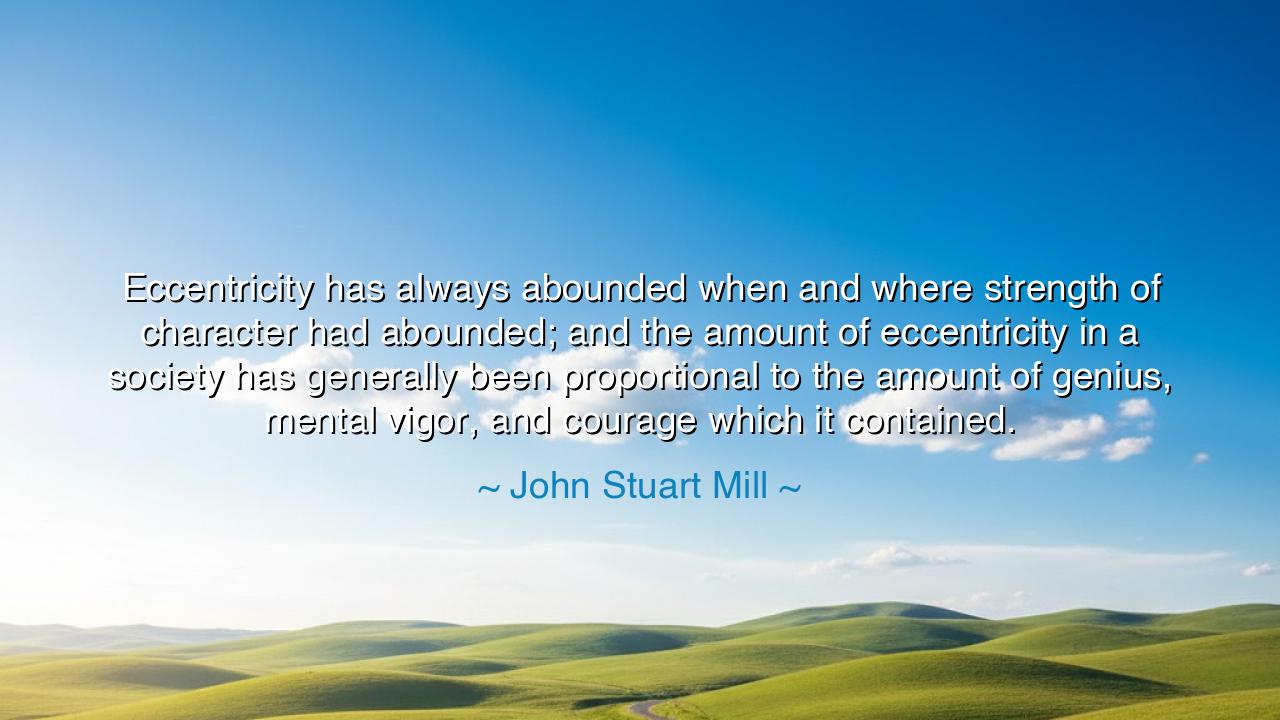
Eccentricity has always abounded when and where strength of
Eccentricity has always abounded when and where strength of character had abounded; and the amount of eccentricity in a society has generally been proportional to the amount of genius, mental vigor, and courage which it contained.






Hear now the wisdom of John Stuart Mill, philosopher of liberty and defender of the individual spirit, who wrote: “Eccentricity has always abounded when and where strength of character had abounded; and the amount of eccentricity in a society has generally been proportional to the amount of genius, mental vigor, and courage which it contained.” In these words lies a truth both bold and eternal — that eccentricity, that sacred difference which the timid world so often mocks, is the mark not of madness but of strength. For where there is courage of thought and depth of soul, there will always be those who refuse to march to the common drum.
Mill, writing in the nineteenth century, lived in an age that worshiped conformity. The Victorian world, bound by custom and politeness, often smothered the fires of originality beneath the weight of respectability. Yet Mill, a disciple of reason and freedom, saw that progress itself is born from those who dare to be different. He wrote these words in On Liberty (1859), that great hymn to the independent mind, as both a warning and a blessing. When eccentricity vanishes, he said, the spirit of freedom dies with it. The vitality of a people — their genius, mental vigor, and courage — can be measured by their willingness to tolerate and even celebrate those who think, act, and live beyond the narrow limits of convention.
To understand Mill’s truth, one must first understand the cost of conformity. When a society prizes comfort over truth, it produces mediocrity; when it punishes originality, it murders progress. The great souls of history — the inventors, prophets, artists, and reformers — were often branded eccentric, even dangerous. Yet it was their courage to stand apart that lifted humanity from ignorance. The eccentric is the pioneer of the unseen road, the lone voice calling from the wilderness while others sleep. His strangeness is the price of his vision, for to see differently is always to stand alone.
Consider Galileo Galilei, who dared to look upon the heavens and proclaim that the earth moved around the sun. For this truth, he was condemned as a heretic and forced to recant. Yet his so-called eccentricity — his refusal to accept the falsehoods of his time — became the dawn of modern science. Or think of Socrates, who questioned the complacent wisdom of Athens and paid with his life. The cup of hemlock silenced his voice, but his courage to think freely awakened a thousand minds after him. In their defiance of convention, these men proved Mill’s words: eccentricity and genius are siblings, born of the same indomitable spirit.
Yet Mill’s insight goes beyond the individual; it speaks of the health of societies. He saw that when a people no longer produce or tolerate the eccentric, their decline has already begun. For the eccentric is not merely an oddity — he is the sign that courage and imagination still live among the people. When all think alike, it is not unity but stagnation. The society that crushes difference builds its own prison, locking away the very energies that would renew it. Thus Mill warns us: beware the time when eccentricity becomes rare, for then genius will be dying, and freedom will have turned to dust.
There is great emotional power in his teaching, for it calls each of us to look within and ask: have I the courage to be different? To think for myself, even when the world sneers? To act according to conscience, even when the crowd condemns? The path of the eccentric is not an easy one. It demands endurance, patience, and faith in one’s own light. Yet to follow the crowd is to betray that inner spark which makes each life unique. The timid soul seeks safety in imitation; the brave soul creates. And in creating, he gives birth to progress.
So, my child, remember this: do not fear being eccentric, for it is often the first sign that you are alive and awake. Let your character be your compass, not the shifting winds of popular opinion. Respect others, but do not surrender your truth for their approval. Every great soul in history — from the saints to the scientists — was once an eccentric in the eyes of their age. Walk boldly, therefore, in your difference, for in doing so you walk in the company of the free.
Thus spoke John Stuart Mill, the guardian of liberty and the champion of thought. His words still ring across the centuries, reminding us that eccentricity is not a flaw, but the lifeblood of civilization. Where there is courage to think differently, there will always be the promise of renewal. And where there is room for the eccentric, there will always be hope for the genius, the visionary, and the brave — those who, by daring to be themselves, lift the world a little higher toward the light.






AAdministratorAdministrator
Welcome, honored guests. Please leave a comment, we will respond soon